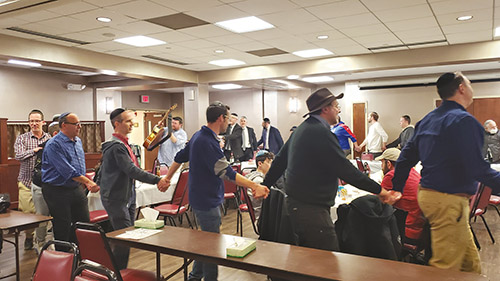


While the snowy weather outside may have been discouraging, the warmth of a musical, Torah-filled Tu B’Shevat tisch at Congregation Ohr Torah in Edison on Sunday night, January 16, raised people’s spirits.
Approximately 75 people attended to take part in an inspirational evening of music and song, divrei Torah and refreshments. Celebrated as a day of ecological awareness in modern-day Israel, Tu B’Shevat is also a time to acknowledge the importance of the harvest and the relationship of the bounty of food as a gift from Hashem.
Rabbi Sariel Malitzky of Congregation Ohr Torah in Edison, Rabbi Steven Miodownik of Congregation Ahavas Achim of Highland Park, and Rabbi Gedaliah Jaffe of Ahavas Yisrael of Edison put together an informal event, assembling a few community members who played musical instruments and/or liked to sing, with the result being four guitar players and a percussionist who led the evening’s ruach.
A broad cross-section of the community from the sponsoring shuls, as well as others in the community, braved the weather to partake in wines from Israel, specialty craft beer, fruits, nuts and other snacks. Sheri Degani of Highland Park had heard that Tu B’Shevat is a day with powerful segulas and thought it was wonderful that multiple shuls were sponsoring such an event. Edison resident Ami Avraham said he was impressed “with the sign of community achdut that put the event together.”
Rabbi Jaffe led with the first of the divrei Torah that were interspersed with the music and singing. He began with referring to the Rashi, which notes that spring is on the way with the arrival of Tu B’Shevat—the worst of the winter is over and sap begins to flow again in the trees. He elicited groans from the women in attendance when he mentioned that Pesach would arrive in a mere three months. It is traditional to pray for a beautiful etrog on Tu B’Shevat, although the holiday of Sukkot is so far away. An etrog corresponds to one’s heart, so one is in essence praying to have a beautiful heart.
Rabbi Miodownik discussed the special relationship between Hashem and the Jewish people, especially at the time of Shabbat Shira. Although Hashem told Moshe Rabbeinu there would be an extra portion of manna given on Fridays, he did not convey that information to the nation. They discovered it for themselves, as the power of Shabbat is so strong it does not need an emissary. The blessings of the day come directly from Hashem.
Rabbi Malitzky spoke about Moshe Rabbeinu’s desire to enter the land of Israel. The land was known for its fruits and produce, but what Moshe Rabbeinu was interested in were the commandments that applied only in the land of Israel. He would not be able to perform them if he could not enter the land. Rabbi Malitzky also noted that Rav Avigdor Miller praised the value of an apple. Not only does it have vitamins and other nutrients, but it is beautiful to look at and tastes good as well.
The event concluded with more singing, some dancing and Rabbi Malitzky’s request that we enjoy some more fruit and remember and recognize what and why we eat and acknowledge the role Hashem has in creating it for us.
Naomi and Neal Auman, longtime area residents, described the tisch as a nice initiative. They came to support the community as they prepared for aliyah. Mike Beberman declared that the best way to warm up a snowy Tu B’Shevat night was by singing, being with people and enjoying the ruach.
Jill Schulman said she came to the tisch with her husband to begin a return to the community after having been isolated since COVID. She was happy to come out to meet new people and enjoy the ruach.
Yifat Shnur of Edison came with her son and his friend and found the event a “beautiful and spiritually uplifting reminder of the essence of Tu B’Shevat, a holiday that often falls under the radar.” She added that the highlight of the evening was definitely the music played together by members of different synagogues.
Even after the official conclusion, a small group of people stayed behind to continue singing, celebrating and playing music. While this event was the first of its kind in the area, it is unlikely to be the last.










